How to avoid losing your job to robots

Philosophers and science-fiction writers alike have been obsessed for ages about the impending machine-age. “Man vs Machine” stories were once enticing because they depicted a far-off and farfetched future.
Except, it isn’t far-off or farfetched, anymore. We’re living through it.
Machine learning, automation, and artificial intelligence systems have workers around the world terrified about losing their jobs to ‘robots.’ And on some level, they’re right to be worried. If you do repeatable, task-based work, jobs like yours are on the way out, either to automation or outsourcing.
And it’s not hard to understand why: if your job requires no humanity, we don’t need you. A ‘robot’ will do it faster and more efficiently, or someone on the Internet will do it for much, much less.
Whether companies should or shouldn’t be operating like that (do companies have a moral obligation to employ humans at the cost of progress?) isn’t relevant. They’re doing it, and that’s what matters. We must first survive within the system before we can hope to change it.
But the widespread panic ignores something that AI and robotics researchers have known for decades.
Moravec’s Paradox
Researchers have discovered that, contrary to intuition, reasoning requires low-level computation, while sensory-motor skills require massive computational resources (more info from ThinkAutomation.com).
Okay, what does that mean?
It means artificial intelligence systems and robots are really good at things that humans are really bad at, and vice versa.
Picking up a pen, for example, is an incredibly easy task for a normal-functioning human, but computationally-intensive for a robot, because we learn how to do it naturally, but we have to teach a machine how to do it. And it’s really hard to teach something that comes naturally.
Another example: Recognizing that your significant other is in a slightly weird mood, prompting you to ask about their day, is pretty intuitive for most people, but almost impossible for a machine, despite recent advancements in smart tech.
High level reasoning on the other hand – difficult for us, requiring years of intense training in a specific subject area – is a straight-foward computational exercise for a machine.
This is good and bad news.
The Connection Revolution
Machines will continue to replace jobs that require bruteforce intelligence or computation. This is bad news for insurance underwriters, customer service reps, and data entry folks (“Tech Experts Predict 13 Jobs that Will Be Automated by 2030,” Forbes).
On the other hand, we’ll need more people who possess the so-called “soft skills” like interpersonal intelligence, empathy, connection, and understanding. If you’re a receptionist and all you do is clock in, clock out, and input visitor data, then you’ll probably lose your job to a machine in the near future. But if, in addition to the data entry, you make the people who come in feel seen and heard, and take a moment to recognize each customer as a person with unique value, you will be irreplaceable. I’ve said it before and I’ll say it again:
Soft skills are hard.
But they’re also the key to navigating a sustainable career in an increasingly automated and unpredictable world. No matter what job you currently have, it’s to your benefit to double down on human connection; to practice, hone, and develop the ability to weave a network of people who trust you and feel safe in your presence.
The future of your career depends on it.
And if we don’t want to get crushed by hyper-intelligent robots, the future of humanity does as well.
Get started by downloading my free resource, “7 Ways to Open a Conversation with Anyone.” Gain access below, plus weekly inspiration in your inbox, and be the first to get notified about new projects.





